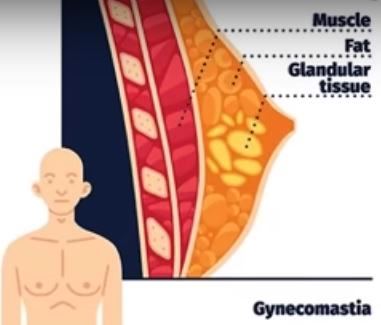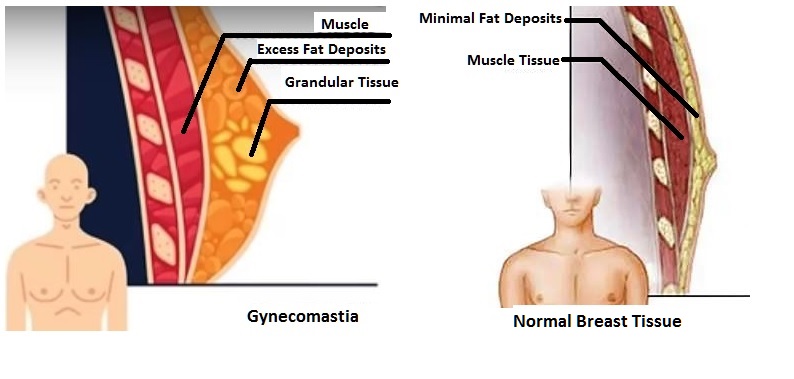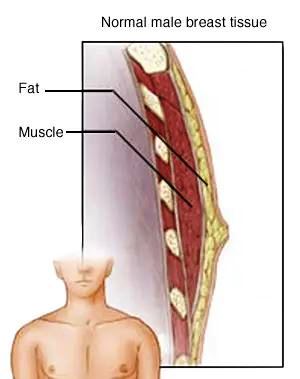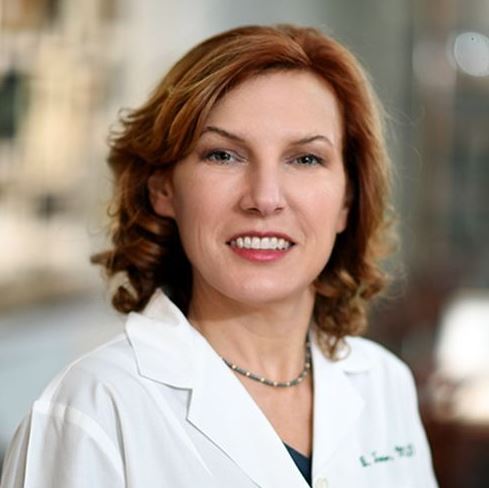Male breast tissue can grow more prominent due to a disorder known as Gynecomastia or informally as moobs. Although it can afflict males of any age, this condition mainly affects older men and boys going through puberty.
In adolescents, it can go away on its own after a few months or years.
An imbalance in estrogen and testosterone levels is the root cause of Gynecomastia.
Depending on the severity of the symptoms and the underlying reason, Gynecomastia is not dangerous, and you can manage it with weight loss medication targeting breasts or surgery.
And like AGA balding, health experts do not consider Gynecomastia a disease. However, if you can use some gynecomastia supplements, diet, and exercise to treat it at home.
And there are over the counter gyno products that can help you treat it. Overall, with treatment, you can make Gynecomastia go away.

What Causes Gynecomastia or Moobs in Men?
Hormonal imbalances
The primary sex hormones in both men and women are testosterone and estrogen. Male traits like facial hair and a deep voice grow due to testosterone, which also contributes to sperm production.
On the other hand, the primary female sex hormone, estrogen, is in charge of developing feminine traits like the development of the breasts and the control of the monthly cycle.
An imbalance of estrogen and testosterone hormones frequently brings on Gynecomastia in men. In men, the breast tissue may grow when estrogen levels are excessively high compared to testosterone.
High estrogen levels in men can occur for various reasons, including using specific medications that may impact hormone levels, an underlying medical condition that affects hormone production, or just as a result of aging naturally.
Medications That Can Cause Gynecomastia
Gynecomastia is a side effect that can occur from a variety of drugs. These consist of:
- Antidepressants
- Medication for ulcers
- Cardiac drugs
- HIV medications
- Cancer therapies
They are all prescription drugs. That means that if you are taking them, then you need to talk to your healthcare provider or doctor about them. In summary, those drugs will affect your hormonal imbalance in the following ways:
- Antidepressants
- Medication for ulcers
- Cardiac drugs
- HIV medications
- Cancer therapies
Antidepressants: Some antidepressants, including tricyclic antidepressants and selective serotonin reuptake inhibitors (SSRIs), can raise estrogen levels and cause Gynecomastia.
Medication for ulcers: Cimetidine and ranitidine, two ulcer treatments, can raise estrogen levels and cause Gynecomastia.
Cardiac drugs: Some cardiac drugs, such as digoxin and spironolactone, can raise estrogen levels and cause Gynecomastia.
HIV medications: Some HIV drugs, such as protease inhibitors, can raise estrogen levels, which might result in Gynecomastia.
Cancer therapies: Some cancer drugs, such as chemotherapy drugs based on estrogen, can raise estrogen levels and cause Gynecomastia.
It’s crucial to remember that not all men who use the above drugs will develop Gynecomastia. It is a rather uncommon adverse effect. And the likelihood depends on the particular drug and the patient.
But if you use any of these medications and are worried about getting moobs, it is important to consult your doctor or healthcare provider.
Duration and Severity of Gynecomastia Related to Medication Use
Gynecomastia associated with pharmaceutical use might range in duration and severity. Once you stop using the medicine, it may occasionally go away without further intervention.
Even if you stop taking the medicine that caused it in the first place, it can sometimes continue. It can also vary in intensity, with some men developing modest breast tissue enlargement while others may have more pronounced breast development.
Several variables, including the drug you are taking, the dosage, and the duration you have used the medication, might affect the duration and severity of “man breasts” associated with pharmaceutical use.
The patient’s particular characteristics, such as age, hormonal status, and general health, may also influence it.
It is crucial to discuss your alternatives with your doctor or healthcare provider if you are taking a prescription that you believe may be contributing to moobs. They can assist you in choosing the best course of action.
That might entail changing your prescription or switching to another one. In addition, you may require surgery to remove the extra breast tissue in some circumstances.
Aging
Our hormone levels can change as we get older. For example, age-related declines in testosterone levels are common in men, whereas increases in estrogen levels are possible.
Hormonal changes may result in an imbalance between estrogen and testosterone, resulting in various physiological abnormalities.
Fat deposits in breast tissue, is one change that can come along with aging in men. An increase in estrogen levels compared to testosterone may be the root of this.
The age groups often affected by gynecomastia are neonates, adolescents, and men aged 70 years and above. These are the age groups that naturally get affected by hormonal imbalances.
In addition to weight on the chest, aging can also lead to a loss of muscle mass, increased body fat, decreased bone density, and a loss of fertility.
Other factors, such as specific drugs, underlying medical disorders, and lifestyle factors like diet and exercise, can also impact hormone levels in men. I turn that can lead to weight gain in the breast tissue.
If you notice changes in your chest appearance or have any worries about your general health, it is crucial to consult a healthcare professional.
Most health conditions, including breast buds, are easy to manage and treat when discovered early.
Increased risk of Gynecomastia in older men
Older men are more likely to experience moobs or enlargement of the breast tissue. That is because estrogen levels might grow or stay stable while testosterone levels may decline with aging.
Once there is an imbalance of estrogen and testosterone hormones, it can cause the breast tissue to grow in size.
Weight gain in breast tissue is not dangerous, but for some men, it can be embarrassing and make them feel self-conscious about their appearance. Therefore, it is worth to consult a healthcare professional if you are about the possibility of developing excess fat in breast tissue.
Your physician can evaluate your hormone levels and discuss your treatment options if necessary. A physician can recommend reducing breast fats using weight loss medication or surgery.
Genetic factors
According to some studies, enlarged breast tissue in men, has been linked to genetic factors. The heredity genetic differences impact the body’s hormonal balance, elevating estrogen levels above those of testosterone.
You can consult a healthcare professional if you have a family history of breast buds and are worried about your chance of getting the condition. They can evaluate your risk factors and talk with you about any necessary safety measures or treatment alternatives.
Overall, Gynecomastia genetic patterns are not entirely understood, and it is unknown if there is a particular pattern to how the condition is inherited.
However, the development of breast buds may be influenced by heredity, as certain genetic differences may impact the body’s hormonal balance.

What are Other Possible Causes of Gynecomastia?
Alcohol and drug use
The disorder marked by the abnormal growth of breast tissue in males, may be brought on by alcohol and drug usage.
Alcohol, some drugs like marijuana, and some of the prescription pharmaceuticals we previously addressed, can disrupt the hormone balance in the body. Excess growth of fats in breast tissue may then develop as a result of that hormonal imbalance.
Are you afraid that drinking alcohol may increase your risk of developing excess fats in breast tissue? Consider asking your doctor for an accurate diagnosis and prescription, or taking over the counter moobs supplements.
Anabolic steroid use
Anabolic steroid use can cause moobs, a condition characterized by the abnormal growth of male breast tissue. Synthetic hormones known as anabolic steroids can imitate the effects of testosterone in the body.
You can develop excess fat deposits in breasts if you use anabolic steroids because they can disrupt the body’s normal hormonal balance.
However, it is important to note that other factors, including heredity, alcoholism, and drug abuse, can also cause excessive growth of breast tissue in men.
In order to receive a proper assessment and recommendation, it is crucial to speak with a healthcare professional if you are using anabolic steroids and are worried about the potential development of Gynecomastia.
Certain medical conditions Can Cause Gynecomastia
Gynecomastia or moobs, a disorder defined by the abnormal growth of breast tissue in men. And men can get it because of certain medical conditions. These conditions include, among others:
- Kidney failure: Gynecomastia can occasionally develop in men with kidney failure because of the buildup of waste materials in the body.
- Liver disease: Excessive breast tissue may result from hormonal imbalances brought on by the liver disease.
- Hyperthyroidism: Hormonal imbalances brought on by an overactive thyroid gland may result in excessive growth of breast tissue.
- Testicular cancer: Chemotherapy and radiation therapy for this condition both carry the risk of causing Gynecomastia.
It is important to consult a physician for a complete medical assessment and advice. If you have any of the above conditions and are worried about developing Gynecomastia, they can help you. Otherwise, if you are healthy, you can consider Gynetrex.
Gynetrex is a three-part system that can assist you in overcoming man boobs and achieving the chest you’ve always desired.
What Treatments are Available for Gynecomastia?
Gynecomastia, sometimes known as “man breasts” or “moobs,” is a disorder in which guys develop breast tissue abnormally.
Physicians treat Gynecomastia in several ways. And the best treatment or management will depend on what caused it in the first place.
Gynecomastia therapy options include the following:
- Medication: Physicians can sometimes use drugs that change the body’s hormone levels to treat Gynecomastia.
- Surgery: A physician may remove excess breast tissue surgically using procedures like glandular excision or liposuction.
- Weight loss: For some people, losing weight through exercise, supplements and a healthy diet can help to shrink the size of their moobs.
- Topical creams: In certain people, topical creams containing gynecomastia-reducing ingredients such as retinoids and glycolic acid may help reduce moobs’ size.
- Hormone therapy: Hormonal imbalances can cause Gynecomastia, which a physician can treat with hormone therapy, such as testosterone replacement therapy.
It is worth noting that the treatment for moobs will depend on what caused it in the first place. The good news is for most people, hormonal management and lifestyle changes can restore their breast tissue.

I encourage you to consult a healthcare professional if you have excess breast tissue concerns so they can properly assess you and identify any underlying issues.
Lifestyle changes – Diet and Exercise
You can treat Gynecomastia successfully with a healthy diet and routine physical exercise. Here are some suggestions for treating this common breast condition in men with diet and exercise:
- Include weightlifting in your exercise regimen: Weightlifting can help you gain muscle mass and lose body fat, which can help you get rid of moobs.
- Eat a healthy, balanced diet: A diet high in protein and low in fat may help reduce body fat and encourage muscle growth.
- Avoid alcohol and drugs: Alcohol and other substances, including anabolic steroids, marijuana, and some prescription prescriptions, can disrupt the body’s hormonal balance and cause Gynecomastia.
- Get lots of sleep: Hormone regulation and production are both impacted by sleep quality.
- Keep hydrated: Drinking plenty of water helps boost healthy hormone synthesis and assists in flushing out body toxins.
Among over the counter treatments that can help you treat Gynecomastia through diet and exercise is Gynetrix. It is designed to help you achieve a healthy lifestyle and eliminate Gynecomastia.
Final Word – Can Gynecomastia Go Away?
Yes, Gynecomastia can go away. However, it can reoccur if the underlying cause is still there. For instance, if the treatment you used to treat it is diet and exercise, stopping your healthy lifestyle will cause it to reoccur.
Similarly, if you used medication to treat or manage it, then it can reoccur if you stop taking that medication.
Not every person with excess fat deposits in their breasts will benefit from diet and exercise, and the ideal course of treatment will depend on the underlying cause of the problem.



